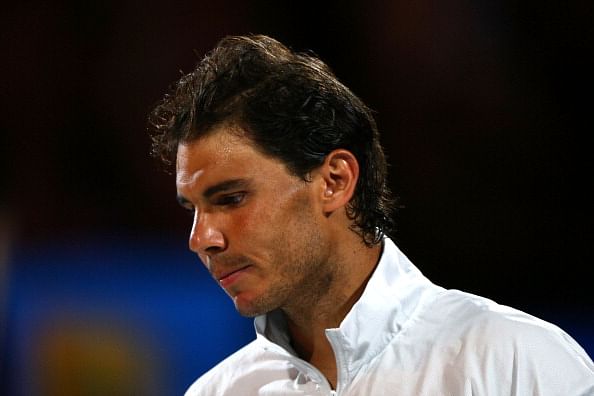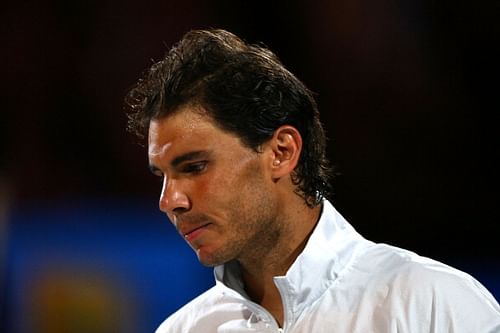
Rafael Nadal: The multi-faceted champion

Rafael Nadal – the multi-faceted champion
When Rafael Nadal won a thoroughly one-sided semi-final against Roger Federer in the Australian Open, it seemed highly improbable to think that he wouldn’t win his 14th Major. The much-debated blister in his palm that had weakened his serve in his quarter-final against Grigor Dimitrov didn’t even cause him to pause as he ran roughshod over the Swiss who looked completely clueless in the aftermath of his loss.
Going by that performance, victory in the final seemed assured. After all, he had a perfect head-to-head record against Stanislas Wawrinka. And Wawrinka was another Swiss who, despite his absolute flawlessness in the rounds earlier, hadn’t even managed to win a set, let alone a match, against Nadal in all their previous matches.
Everything was weighed in – stats, shot selection and what not. There were comparisons between Wawrinka’s mental block against Nadal and Nadal’s tactical ability to deal with Wawrinka’s game that was flowing ever so beautifully. Debates and discussions also raged about the whole GOAT paradigm comparing Roger Federer’s Majors tally versus Rafael Nadal’s possible overtaking of the same. The tone of these numerous discussions, however, hinged on just result. While the Swiss had made some indelible inroads into the men’s singles circuit in the new season, there was no way that he could prevent Nadal from equalling Pete Sampras’s haul of 14 and then proceeding on to shake off Federer from the pedestal of having the most number of Major wins.
All the signs pointed to a comfortable victory for the Spaniard. He was a champion, and he would get the job done. But the first set unfolded completely contrary to expectations, as Wawrinka blasted Nadal off the court to take it 6-3. And when Nadal hobbled off the court, taking a medical time-out barely minutes into the second set, there emerged another side of the person that is Rafael Nadal.
The unpredictability of Rafael Nadal to not do well in a tennis match is not because of his erratic shot-making and his confusing shot selection. Rather, it is almost invariably because of his health issues that make spooky appearances during important matches of his career.
Large portions of the crowd at the Rod Laver Arena jeered and shrieked at Rafa during his near-seven minute long medical time-out in the second set, even as on court Wawrinka argued with the chair umpire, Carlos Ramos, about the nature of Rafa’s injury.
As the remainder of the match unfolded, watching Rafa in tears and in excruciating pain, trying to just be on the court rather than stop the match mid-way was like a gruesome scene repeating itself. At the very same venue, no less.
For Nadal’s fans mourning in the wake of the loss in the final, the gloom and despair was not about his lost chance to claim his 14th Major, but about the setback to his health.
The comeback of the previous year, the domination that saw him get back to the top of the rankings’ pile, and the continuation of that victory run into this year all looked like a mirage. A mirage that, while satisfying the eyes from a distance, nonetheless left one with unfulfilled anguish, as one got closer to it.
Over the years Rafael Nadal fans have no doubt gotten quite used to this uncertainty. Their expectations are thus more grounded than those of the fans of any other player enjoying a comparative long-lasting period of sustainability and consistency. Their savouring of each of his victories, and their cries of protest against anyone who raises an opinion against him, are based on this unwavering love that has literally endured through the best and worst times of Nadal’s career.
But it still makes on-the-spot acceptance of his adversities hard. More so when the man in question refuses to talk about his health problems, as Nadal repeatedly avoided the subject in his post-match press conference, emphasising instead that it ‘was Stan’s day.’ Even those afflicted with the worst case of ‘sour grapes’ cannot dispute the wealth of sincerity behind Nadal’s gesture to put the winner ahead of him, rather than complain about his ailments.
This admirable trait of humility is yet another face to the complexity that Rafael Nadal symbolises to the tennis world. It is this trait of his that makes his fans even more boastful of their status of being hitched to the unofficial Rafael Nadal bandwagon. It is also this quality of graciousness that makes Nadal a difficult person to look at with contempt and dislike.
He has his faults and he isn’t perfect. But then, which player is? Even the ones who are regarded to be the most good-natured and courteous amongst them all, miss a footing or two occasionally when it comes to politeness and courtesy. Who complains about them and to whom?
It is easy to pinpoint Nadal’s faults and enumerate them, emphasising on their impact to his stature, because he has such credentials to exploit in the first place. These criticisms mark a totally new side to the whole existing image of Rafa Nadal as well. An image that is peppered with ups and downs, not just on the tennis courts, but also off it.
It’s an image of a player who, while being unarguable one of the greatest ever, isn’t an exception to bias and partisanship, with his words and actions modified to suit the interpretations of the listeners.